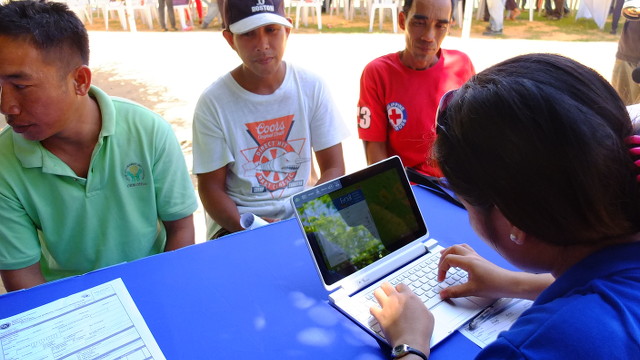SUMMARY
This is AI generated summarization, which may have errors. For context, always refer to the full article.

Manila, PHILIPPINES – More than one million fisherfolk have registered under the municipal fisherfolk registration program, boosting the government’s ability to extend health care and insurance to the sector, announced Bureau of Fisheries and Aquatic Resources (BFAR) Director Asis Perez on Friday, August 22.
The milestone is a step closer toward fulfilling the 16-year-old Philippine Fisheries Code of 1998, which mandates the government to have a complete registry of municipal fisherfolk.
A registry better equips government to extend basic services to fishermen and helps prevent the overfishing of Philippine oceans.
Before January 2014, the BFAR, an attached agency of the Department of Agriculture (DA), had only 46,000 fisherfolk in its database out of the estimated 1.7 million fisherfolk nationwide.
With the one million mark hit, Perez is confident that all fisherfolk will be registered by December this year.
The National Program for Municipal Fisherfolk Registration (FishR) formally started in January 2014. As of August 22, it has 1,048,030 fisherfolk on its list.
“We will make sure that every figure and information we will get from FishR will be translated to concrete programs that will further develop the livelihood of our fisherfolk,” said Agriculture Secretary Proceso Alcala.
BFAR personnel, with the help of local government units, USAID, and the private sector, went around fishing villages all over the Philippines, encouraging fisherfolk to register.
Partners like the Department of Science and Technology (DOST) helped provide Internet connection to enable fisherfolk to access the online database.
In the case of registration in Bohol which Rappler witnessed, private partners like Microsoft provided tablets to enable extension workers to register fisherfolk from far-flung islands.
Fisherfolk are asked to input information like age, number of children, fishing equipment used, and what aspect of the fishing industry they are engaged in (fishing, fish selling, seaweed farming, aquaculture).
Healthcare, insurance for fisherfolk
The FishR database will enable the government to bring basic services to municipal fisherfolk who are among the poorest in the country. (READ: PH oceans in crisis: The sad state of small fisherfolk)
According to BFAR, 39.2% of Filipino fisherfolk live below the poverty line.
To give them access to health care and insurance, the FishR registry will be crossmatched with the lists of the Department of Social Welfare and Development (DSWD) and the Department of Budget and Management (DBM).
If the FishR-registered fisherfolk’s name also appears on DSWD’s National Household Targeting System-Poverty Reduction (NHTSPR) list, they will automatically be given a PhilHealth number giving them access to universal healthcare.
If the fisherfolk’s name does not appear in the DSWD list, they can still be covered by PhilHealth’s Sagip Program.
Only registered fisherfolk living below the poverty line will receive free health care coverage. Those better off will have to pay a minimum fee.
If their names also appear in DBM’s Registry System for Basic Sector in Agriculture (RSBSA) list, they will be given personal and crop insurance through specially-allotted funds from the Philippine Crop Insurance Corporation (PCIC).
The insurance will cover fishing boats, seaweeds, fish cages, fish ponds, and other agricultural stocks and aquaculture facilities damaged by calamity.
Carmen Hutaba, a department manager of PCIC, said her agency has P1.184 billion ($27 million)* to pay for the free insurance. She also gave assurances that a “big percent” of FishR-registered fisherfolk names also appear in the RSBSA list.
The ongoing crossmatching found that 116,422 names so far appear in both lists. These fisherfolk will thus receive free personal and crop insurance against calamities after filling up the required PCIC forms.
The free insurance does not cover accidents. For insurance against accidents, fisherfolk pay P35 ($0.80) a month for P50,000 ($1,141) accident insurance, or P70 ($1.6) a month for P100,000 ($2,300) accident insurance.
Good for our oceans
Having a record of all small fisherfolk in the country also poses benefits for the environment and law enforcement.
With the registry, local government units and the BFAR will know how many fishermen are fishing in specific municipal fishing grounds. This will enable them to monitor fishing activities and prevent overfishing, said Perez.
Today, 10 out of 13 major fishing grounds in the country have been overfished, according to BFAR data. (READ: Want to feed the world? Save oceans first)
Fish catch has dwindled drastically through the years. If a fisherman could catch 20 kilograms of fish in the 1970s, today the average catch is 4.76 kilograms a day.
Since all registered fishermen get an identification card, law enforcers are able to identify which fishermen can fish in the municipality’s waters. Fishermen registered under that municipality get priority access.
In times of post-disaster rehabilitation, government and non-government aid agencies can better identify the needs of each affected fisherfolk.
They will be able to prevent giving boats or nets to the same fisherman twice or prioritize fishermen whose single boat was swept away by a storm over those with extra boats.
Milagros Chavez, a fisherfolk leader from the town of Cuenca, Batangas, said the program has instilled a sense of pride in her profession.
She said: “Ipinaliwanag ko yung mga benepisyo sa pag-rerehistro sa FishR sa mga kapwa kong mangingisda. Happy sila na may mga programa ang gobyerno para sa aming sektor lalo na yung nasa malalayong lugar.“
(I explained to my fellow fisherfolk the benefits of registering in FishR. They were happy to hear that the government has programs for our sector, especially those who live in far-flung places.) – Rappler.com
1 USD = Php 43.80
Add a comment
How does this make you feel?
There are no comments yet. Add your comment to start the conversation.